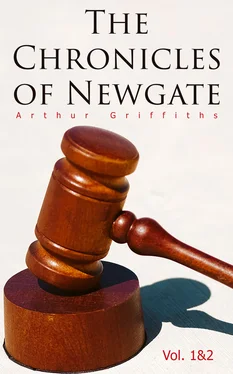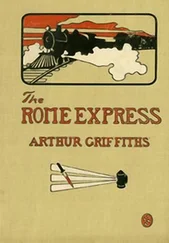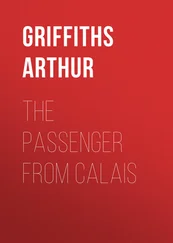“Now the coney-catcher hath the matter as he would wish it, and taking their money, first he goeth presently to the justice and certifieth him that these which he had apprehended did none of them cut the purse, and for that he hath gotten knowledge who did, he desireth that they may be bailed.” The justice, glad to hear the culprit is known, yields ready assent, and the captive cut-purses are set free.
H.’s next business is to hunt up the real thief, and meeting him, “spareth not to tell him how sore the justice is against him, and how earnestly the countryman will pursue the law; and further, he sweareth that some of those that were in Newgate told the justice plainly that he cut the purse. This peal ringeth nothing well in the cut-purse’s ears, who can find no favour but to Newgate.” So he entreats the coney-catcher to stand his friend, who promises at length to do any good he can, at the same time cautioning the cut-purse to confess nothing, “what proof soever come against him,” assuring him further, that the man who lost the money, although sore bent against, “yet he will partly be ruled by him, H.” But the arrest is made; the thief is conveyed to Newgate, and there, by way of welcome, a good pair of bolts and shackles are clapped upon his legs. Then H. sends for the countryman, telling him the good news that the thief is taken and in limbo; and together they go before the justice, to whom H. “signifieth how the case standeth, railing mightily against the cut-purse,” whose guilt can easily be proved, and begging his worship to summon the thief. The cut-purse is sent for, and “having taken out his lesson,” doggedly refuses to confess, upon which the justice returneth him to Newgate, there to abide till the next sessions. The countryman is bound over to give evidence, but he, “dwelling far from London, and it being long to next Law Day, allegeth he cannot be in the city at that time, for he is a poor man, and hath great occasion of business.”
On leaving the justice H. returns to Newgate, and assures the cut-purse that he has laboured hard “with him who had his purse cut to take his money again, and not to give evidence against him; that if he may have his money again he will presently go out of town.” The cut-purse, taking H.’s hand (as witness) that no man shall give evidence against him at the sessions, doth presently send abroad to his friends for the money; which as soon as it cometh he delivereth to H., and withal a large overplus, because he will be thus sure of H.’s favour.
“This done, H. goes to the countryman and tells him he got no more but six or seven pounds, of which, if he will accept, and proceed no further against the party, he hath it to pay him; marry he will not be known to the countryman, but that he had that money of some friend of the cut-purse’s, who upon the former condition is willing it should be paid, if not, to have his money again.
“The countryman, having haste out of the city, is glad to take it, out of which sum, if it be seven pounds, H. must have half; so that the poor man, of ten pounds hath but three pounds ten shillings, whereas the coney-catcher by this account hath got at one hand and another very near forty marks. The money shared, the countryman takes horse and away he rides. Again H.’s mouth is stopt, and the next sessions the cut-purse is quit by proclamation, no man being there to give evidence against him.”
Plain symptoms of the approaching struggle between the king and the commons are to be met with in the prison records. Immediately after the meeting of the Long Parliament, orders were issued for the enlargement of many victims of Star Chamber oppression. Among them was the celebrated Prynne, author of the ‘Histriomatrix,’[58] who had lost his ears in the pillory; Burton a clergyman, and Bastwick a physician, who had suffered the same penalties, all came out of prison triumphant, wearing ivy and rosemary in their hats. Now Strafford was impeached and presently beheaded; Laud also was condemned. The active interference of Parliament in all affairs of State extended to the arrest of persons suspected of treasonable practices. A curious document issues from Newgate in 1642, where several supposed rebels and others have been imprisoned. It is a petition[59] which was presented to Parliament by Colonel Goret, who had commanded some of them in France. The petition sets forth that Daniel Dalley, master of a small barque, of “Kinsaile in Ireland,” had been freighted, about the 10th November, 1641, out by two gentlemen, merchants of Kingsale, with beef, tallow, and hides for “St. Mallowes in France.” There these commodities had been “vended,” and the same merchants laid out their money in wine and fruits to freight the vessel home again. “All being done, and they ready to set sail, the governor (of St. Mallowes) sent a command to Daniel Dalley the master, that he should take nine gentlemen with him, which should pay for their passage.” “By reason of the troubles,”[60] the master refused; but Dalley was obliged to take them on board, under threat of committal to gaol, and by the governor’s warrant and command. He then set sail, and two days after he had gone to sea a storm rose at south and S. S. W., which drove them into Saltcombe in the west country, “where the passengers went ashore and took lodging till it would please God to send fair weather.” However, notice of their landing came to Captain Foskew, “one that had command of a fort of his majesty’s there,” who summoned them before him and examined them. Finding they could not give a good account of their designs, he committed them, with the merchants and the ship’s company, until he communicated with Parliament. In reply the Parliament sent for them to London, and lodged them in Newgate. There they lay from day to day expecting to be called up by Parliament, but this being so long delayed, they petitioned for enlargement.
On the Parliament side it appeared that information had been given the House of Commons that certain mariners and commanders were proceeding from France to Ireland to take part in the rebellion, they having a commission about them for the purpose. Also that one Captain Foskew had taken and stayed the said mariners and sea captains. “The honourable assembly,” therefore, as well out of their pious and grave consideration for the better satisfaction of the kingdom, as for the prevention of such dangers as might follow from their landing in Ireland, made an order to bring the prisoners to London for examination. This was done with all proper precaution. Each sheriff saw to their safe conduct in his own county, “not suffering them to go together, but the commanders to be kept away from the rest.” By virtue of the Speaker’s (Lenthall) warrant, they were delivered by the sheriff of Devon to the next sheriff, and so from county to county, until they came to Middlesex, where they were received by the sheriffs of Middlesex, and committed to Newgate, the county gaol, “where they were with much care imprisoned and strictly kept, some of them being placed in the master’s, others in the common side.”
The petition already mentioned set forth that the said captains, “being all strangers and destitute of acquaintance, except with a few persons of this town. They declared that they were his majesty’s true and loyal subjects, most of them born within the king’s realm of Ireland, all strictly obliged and most ready to defend his rights and privileges to the utmost of their power. Being ‘necessitated in their native country,’ they repaired three years previously to France, where they served in martial affairs under Colonel Goret, till they were disbanded, and resolved to return home. They were, however, detained at Saltcombe, in the county of Devon, where they were imprisoned and their goods seized. Since then they had lain in Newgate, ‘where they are liable to remain in great misery, to their loss of time, and utter destruction and ruin.’ They begged, therefore, that they might be ‘forthwith convented before the honourable assembly to answer their charge,’ and having proved their loyalty, might be restored to their former liberty and fortunes.” The answer to this petition is not recorded, except that the prisoners hoped daily to be sent for, a committee of the House having been appointed to examine them. Meantime they carried themselves civilly in the gaol, and with patience looked for the time when they should be called for their answer. They were conscious of innocence; they denied “all intentions of assisting the rebels in Ireland, or any act which might tend to their disloyalty,” the true cause of their return home being a want of employment in France.
Читать дальше












